The Light from the TV Shows: A Chat with Alan Spencer (‘Bullet in the Face’)
I’ve said before – if not in this column, then certainly elsewhere on the ‘net – how a great deal of my long-term tastes were established during my teen years in the ’80s, and one of the shows that was must-see TV for 16-year-old me was the ABC sitcom Sledge Hammer!, created by Alan Spencer. As a result, my eyebrows shot skyward when I first learned about the IFC series Bullet in the Face, since the press release prominently featured Spencer’s previous credits. Too bad the network’s programming and promotional departments weren’t quite as enthused as I was: the show’s six-episode season was noticed by precious few, resulting in a quick departure from the airwaves.
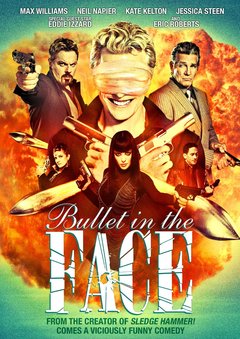
Thank goodness for Shout Factory, then, a company who knows a future cult classic when they see one: they released Bullet in the Face on DVD a few weeks back – sorry, I was at the TCA tour at the time, or I would’ve been able to promote it more heavily right as it hit the shelves – and were kind enough to set me up with an interview with the aforementioned Mr. Spencer.
After discussing his most recent endeavor in considerable detail, you will be unsurprised to learn that I took a bit of time to geek out as well, enjoying the opportunity to learn more about his friendships with Marty Feldman, Andy Kaufman, and Anthony Perkins, and to find out if we’re likely to ever see Sledge Hammer! return.
Bullz-Eye: How did Bullet in the Face originally come about? It seems to owe at least a spiritual debt to Sledge Hammer!, but from what I can tell, it appears that the project existed in some form – if only as a vague concept – before you ever came aboard.
Alan Spencer: Well, first of all, there’s nothing spiritual about Sledge Hammer! [Laughs.] Basically, the IFC network… An executive I knew at the IFC network said they had a concept in development that wasn’t working. It was called Dieter Horn in Night Port, and if you Google it or use any search engine, I think you can see information about it. They had made a two-minute trailer – kind of a sizzle reel, as people are wont to do – and a Canadian production company was behind it. The trailer shows a spoof of ‘80s tropes about a German cop called Dieter Horn, who was apparently a bad guy who became a cop, and it’s heavily rooted in the ‘80s. It’s never explained why it was German, by the way. I couldn’t figure that out. But it’s a spoof of a Miami Vice sort of city, and it was… A lot of people are doing ‘80s parodies – MacGruber, and there’s a miniseries now (The Spoils of Babylon) – and it was an ‘80s spoof, and…that didn’t interest me. And I guess they developed scripts for it and it didn’t work, so it was a piece of… The term is “broken development.”
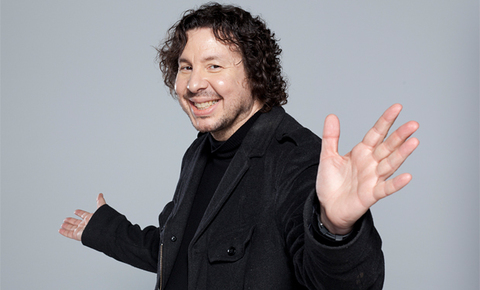
Since I’m one of the few people that had done and sustained a successful half-hour action comedy, they came to me and asked if I’d be willing to supervise the writers and retool this. It was basically… I was given, like, carte blanche for whatever I could come up with to fix this. So, anyway, I took the one kernel, one idea from it, and threw everything else out. And the only kernel from it was the German, formerly a bad guy, turning into a cop. So that was it. I threw everything out, re-titled it, and came up with all new characters, an all new milieu, and the kind of a graphic-novel city I set it in.
I also threw out the ‘80s baby with the ‘80s bathwater, because a lot of people can’t reference the ‘80s. I lived through the ‘80s already, and that didn’t interest me to go through it again. I don’t have that hair anymore, I don’t wear the pastels, I wear socks… [Laughs.] So I didn’t want to deal with that at all. I wanted something new and fresh. Also, since I had some creative freedom, I really wanted to go for it, so they were kind of thrilled when I decided to write it myself. I just said, “Let me write it,” as opposed to going through the machinations that we would’ve to find some writers. So they were surprised and happy, but I think that was their agenda all along, to have me write it myself.
So I indulged myself. I didn’t imagine this getting made, so I wrote something very, very extreme, and going further than the restraints that I was used to working on in network television. And then, lo and behold, I was surprised. I got a call from the network saying, “We’re not going to make a pilot for this.” I said, “Oh, all right.” They said, “We’re going to go straight to series!” So it was a six-episode order with the contingency that I write them all. I knew something was up before I got that call, because on Facebook all of a sudden I was being getting friended by IFC executives. [Laughs.] That was kind of the hint that something was in the works. That’s how social media works now, right? If social media was existing during World War II, and if all my Japanese friends were unfriending me, I think I would’ve anticipated Pearl Harbor. That’s sort of how it works.
BE: You made a comment about how the city was influenced by graphic novels. Were there any particular graphic novels that influenced you? There’s kind of a Sin City vibe at times, but that may be incidental.
AS: It was only things I knew about graphic novels. I actually don’t really read them. I don’t think I… I’ve looked at them. I mean, a long time ago. Somebody as a birthday present gave me – like, in the ‘80s – The Dark Knight Returns or something. But it was more just the feel of graphic novels, what I’d heard about them. I don’t really read them. Anything I read, usually you’d put a bookmark in it. [Laughs.] So I don’t really read the graphic novels. People are illiterate. I mean, I’ve seen magazines where people have bookmarks in them. Like, LIFE Magazine! So it was just what I knew of graphic novels. And also video games. Those sort of heightened cities of Grand Theft Auto and things like that. So I was kind of dealing with the zeitgeist even though I’m not a specific devotee of any titles that I can give you.
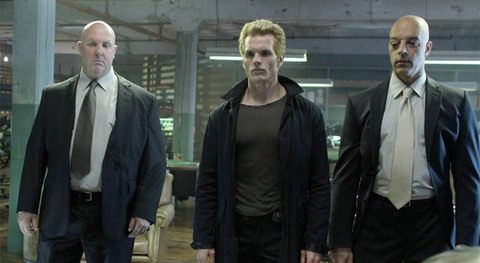
BE: Not that I didn’t enjoy Bullet in the Face – I remember watching and loving Sledge Hammer! during its original run – but it’s surprising to hear that IFC went for the series so enthusiastically. Didn’t you get any pushback from the network about the violence?
AS: No, not really. Not during the scripting of it, anyway. But once they saw it… [Laughs.] You know, once the episodes were finished and people saw how graphic it was and played for real, that was part of the, uh, I would say unusual scheduling that the show received at their hands. So it came afterwards, after they saw the execution. It’s always different when you do something on the page versus how it’s done. So people could read about this head being tossed around and laugh, and then when they see the human head looks really real, people go, “Wow, uh, that’s some good special effects… So, uh, that’s how we’re playing it, huh?”
But that just always happens. You read something, you have it in your mind, and then later it’s something else. It was very funny when they’d go, “Wow, I didn’t know there’d be all that, uh, blood there…” Well, that’s kind of what happens when you get shot! [Laughs.] But, you know, during the ‘80s, during Sledge Hammer!, when people got shot, we didn’t show blood. Partly because it was a sitcom during the family hour, but also because the network broadcast standards wanted it cartoony. So obviously times have changed.
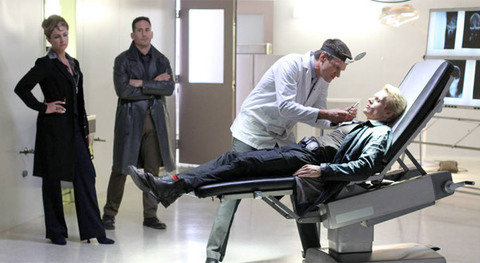
BE: So how was it working with the cable mindset versus the broadcast networks? Did you feel like you had more freedom?
AS: Yes and no. Actually, you know, working within the confines of Sledge Hammer! I had complete creative autonomy and they were very, very supportive. The network is a big machine, airing programs seven nights a week at that time, and it wasn’t micromanaged to the degree that things are done now. So, actually, I’d say I had more freedom overall then. I have freedom pretty much with the scripts. The constraints came in, certainly, later once we were shooting and all those sort of things.
Also, the thing that’s different now is that network executives… the executives on the project from the network airing it weren’t executive producers on the show. They didn’t get credit on the show. Now a lot of people get credit on the show, which is a very, very different thing. I mean, everybody gets credit on shows. Everybody’s a producer now. The catering person, I think, was one of the exec producers on it…and, you know, that was fine, because the coffee was really good. [Laughs.] But you see more and more people getting titles of “producer” on shows, whereas back on Sledge Hammer! I was the sole executive producer. And that just doesn’t happen anymore. I think there are contests now where, when a show airs, if you win, you get to be an executive producer on the show. You don’t have to do anything!
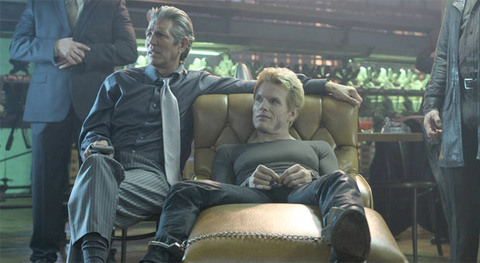
BE: In regards to the casting on Bullet in the Face, it was definitely a coup to get Eddie Izzard and Eric Roberts to play the crime lords.
AS: Yeah, Eric I wrote it for, so that was delightful, to get your first choice. But Eddie was somebody that never entered my mind. It was actually Dan Pasternack at the network who suggested Eddie, reminding me that, even though Eddie is a world famous comedian, often his acting is serious roles. He eschews the comedic and does straight parts. We wanted a villain, we wanted somebody who could play this villain and be vulnerable as that and intimidating, and Eddie has said in the past that he would love to be a Bond villain, so this was the best of both worlds. Because he added comedy to it, he gave me more comedy than I was anticipating and I was able to write to that, and he also got to play a real gang kingpin with some menacing moments and everything like that. So it was a delightful collaboration.
And I also told him the truth. Because when I first met with Eddie, he was fascinated why I made the character agoraphobic and only staying in his hideaway there. And I just told him the truth. I could’ve said, “Well, it gives the character an extra edge, it’s kind of original…” But I just said, “Well, so we can get a big star like you and shoot you in five days in one location. That’s why I did it.” [Laughs.]
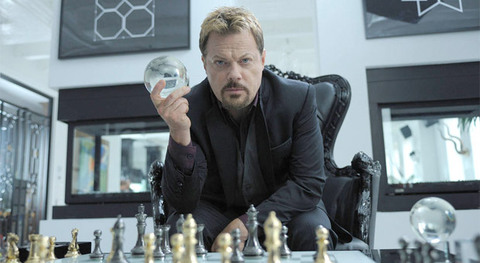
BE: As far as the conclusion of Bullet in the Face, you said on the audio commentary that you likened it to The Prisoner, in that you see it as a proper conclusion rather than a cliffhanger, despite how others might feel about it. With that said, however, would you still consider revisiting the general universe that you’ve established for the series?
AS: Yeah, I actually think so. I enjoyed the cast very much. I mean, it was an arduous shoot, with various factors playing upon that: budgets, short schedule, newer people… I was a veteran on the set! [Laughs.] When I did Sledge Hammer! I was the neophyte show runner, and this time I was the one with all the experience coming in there. But, you know, it’s a very, very tricky and difficult thing. Even doing it with the Canadian tax rebate, the budget breaks you get there, it’s very, very tricky to do action comedy on a low budget, which we did. You know, we pulled it off. I mean, people feel it doesn’t look low-budget. It has some ambition and some scope and some style. But it was very complicated to do. I had to write it in a certain mindset to get it done, and I was also rewriting on the set, contending with problems that were happening, mistakes and accidents and weather and various things like that. But I would revisit it. I enjoyed the cast enormously.
But I approached it as if that’s all it was going to be, because when they made a deal for me, they couldn’t afford any holds on me. They could only make a deal for six. That was the best they could do. And it’s such a bizarre show that, you know, if I didn’t come back to do it, somebody else would look at this and go, “What the hell…?” [Laughs.] But like you said, I approached it like Patrick McGoohan’s The Prisoner…although, you know, I have to look into that a little bit more. I think they always designed it to be finite, clearly, so that’s how I thought of this. I gave it an ending, even though it’s a little ambiguous, but if you pay attention to it, it’s an ending. You can accept it one way as an ending, and you can accept it another way as a question mark. So it’s either a period or a question mark. I always leave the valve open, because you never know. At the end of the first season of Sledge Hammer! I blew up the world because I assumed we weren’t coming back…and then they renewed it!
BE: I mentioned the audio commentary a moment ago. I actually listened to it in its entirety – across all six episodes – and there were a few other things you mentioned that I wanted to ask about, the first being the story about how you snuck onto the set of Young Frankenstein and ended up with Marty Feldman as a mentor.
AS: Yeah. A mentor and a friend.
BE: That film was my first introduction to him, but in everything else of his that I’ve seen subsequently, he’s always seemed like such a fascinating and hilarious fella.
AS: He is probably the nicest human being I’ve ever met, maybe even in my entire life. There is a wonderful biography of him by a fine gentleman named Robert Ross called Marty Feldman: Biography of a Comic Legend, and I’m in that, and…it was a little surreal. The book came out while I was in Montreal shooting this, so I ordered a copy from Amazon, and they delivered it to the hotel. It was a little surreal to be in another country, sitting in your hotel room at night, reading a book, a biography of somebody I was a huge fan of before I ever met him, and then kind of midway through the book, you come in. [Laughs.] You read yourself coming into the book, and you stay through it throughout the end, and then your photo is in it and everything, and…that was kind of unique. It got me thinking about how, “Wow, if I hadn’t taken that kind of quantum leap and taken a Rapid Transit bus down to Fox Studios, if I hadn’t gone down there, I wouldn’t be in this biography! I’m glad I did!”
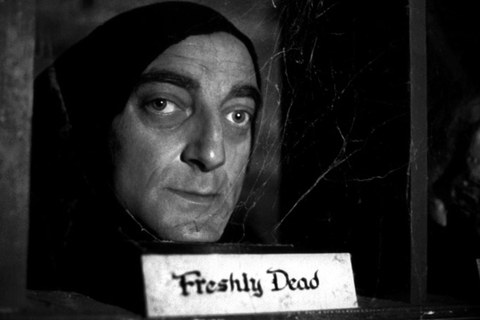
He was a wonderful man, and…well, I certainly got to know Mel Brooks later and collaborated with him on things (most notably on the sitcom The Nutt House), but Marty gave me a lot of confidence. He was very supportive of people, he was very intellectual, and…he was just a very, very gentle soul. When you see someone like Marty Feldman… Well, I saw him long before you did, in his BBC work and things like that, but when you see Marty Feldman – particularly as most people knew him, and their introduction to him was from Young Frankenstein – you don’t really get a sense of what he would be like as a person, because he’s playing that manic kind of gnome character. And he was a soft-spoken, introspective, warm, lovely, sweet human being who was caring about other people. As someone described him… I remember his partner Barry Took saying, “He was a very giving man who helped everyone who needed it.” I was certainly a recipient of his kindness and friendship, which I was certainly grateful for. He was the ultimate example of “don’t judge a book by its cover.”
BE: Feldman directed at least two films after you met him – The Last Remake of Beau Geste and In God We Tru$t – and I’m sure he taught you something about directing during the time you knew him, but is there anything in particular that you can point to?
AS: I learned a lot from him, but it was more about writing, actually, than anything else. He wrote and directed those films, and he started as a writer before he became a performer, and a lot of those things stayed with me. They stayed with me for Sledge Hammer! and they stayed with me for doing Bullet in the Face, which was basically… You ask yourself sometimes, or you’ll say – and all of us do this – something like, “You know what I’d love to do but I can’t?” And Marty would say, “Well, why not, love?” And that would be the thing that you’d do: the thing that was in the back of your mind, or the thing that you’re pondering but saying, “Oh, they’ll never let me do this,” or, “I’d love to be able to do it.” That’s the thing you want to reach. So that’s what I was doing time and time again, and that’s why some of the stuff has gotten the attention it has for being outrageous. So it’s not censoring yourself and not letting pressure and society constrain you. It’s saying, “Hey, why not?” So that, I think, is the primary thing that I certainly learned from him. Because he was pretty fearless and…just a remarkable human being.
And also a lot of fun, too, because… [Starts to laugh.] You know, his look and everything like that. He had a unique kind of, like, peripheral vision. Literally, because of his eyes were skewed, I think he had somewhat of a blind spot in front of him. So the joke was, “To play hide and seek with Marty Feldman, you stood in front of him.” He did describe a very funny thing about how, when he was living in Los Angeles and had to get his American driver’s license, the DMV guy when he had to go on a drive with him, Marty’s eyes were causing him anxiety…and, boy, Marty was playing it up!
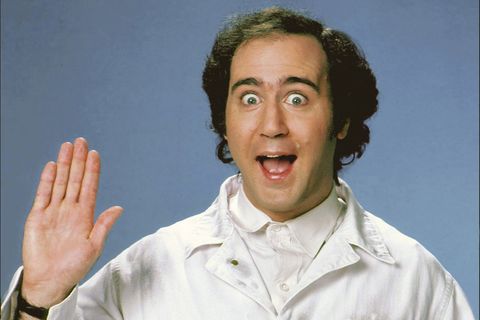
BE: You also mention at one point that you were friends with Andy Kaufman, but you never said how you came to cross paths with him in the first place.
AS: That was when I was first starting out as a writer. I began as an apprentice writer, and then I got bumped up to full-fledged staff at Paramount Studios. That was the time when Mork & Mindy and Laverne & Shirley and Taxi were all there, and I was part of that kind of circle of shows. I was working there, and Andy was doing Taxi, and…that’s how we met. I think the first time I met him he might’ve had a Howdy Doody ventriloquist dummy or something with him. [Laughs.] It was kind of interesting. So I met him and to know him even before Taxi debuted and became friends with him. It was kind of interesting on the lot at Paramount back then. It was kind of a collegiate feel. People would hang out and play basketball and get to know each other. It was kind of fun, you know? It was kind of socializing or something like that going on.
And they were shooting the first Star Trek movie there, so that was fascinating. You’d see Klingons walking out, eating in the commissary. I remember walking around, and we saw William Shatner and Leonard Nimoy in full makeup, and I remember saying something like, “Hey, I wonder if that’s Star Trek they’re shooting there!” [Laughs.] They actually sent a memo to us to stop visiting the Star Trek set, because we weren’t coming back to work. We’d go over after lunch and just stay there! So that was a problem. It was like flypaper. It was the bridge of the Enterprise! So that was kind of an exciting time. And movie studios aren’t like that anymore. We don’t really shoot at movie studios anymore. We’re always on location, and the movie studios – the ones in Hollywood, anyway – they’re always shooting commercials there, or infomercials or stuff like that. The Paramount lot back then, though, was a lot of fun, and it was interesting. Whereas with Bullet in the Face, we were shooting in Canada, in Montreal, which is a whole other experience. But you listened to the DVD commentary, so you heard me talk about that.
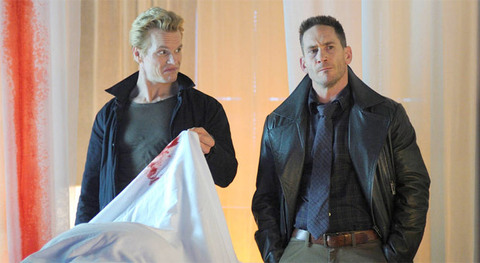
BE: Yeah, you mentioned in particular the language barrier.
AS: Yeah. Yeah, it’s a big barrier. A lot of people speaking French. But, you know, when someone’s speaking French, and they’re looking over at you and pointing angrily, you kind of get a sense of what they’re saying. [Laughs.]
BE: Looking at your filmography, it’s still very surreal to see that you penned an episode of The Facts of Life.
AS: Yeah, I’m ashamed. It’s a black mark. I’d rather see my name on Schindler’s list. [Laughs.] It doesn’t reflect what I am, but it was a seminal thing. And, listen, it’s a nice show, and I got paid. And there were nice people on it, certainly, but it wasn’t my personal taste. There are a lot of people that love The Facts of Life, but, y’know, I think I’m more associated with writing sitcom manifestos than that! And I don’t recognize anything that I wrote in it. It was rewritten, because they rewrite the shows and everything like that. So it was… Yeah, I don’t know what to say about it. It’s the only time I’ve ever typed the name “Tootie” in a script.
BE: I haven’t gone back to confirm this, but I feel like it also may be the only episode of the show to share its title with a John Ford film (“What Price Glory?”).
AS: Uh, probably, yeah. Yeah, I would think. They didn’t really have episodes called “Stagecoach” or anything like that, y’know? [Laughs.] So I guess… That’s a piece of trivia that I would never have thought of – and will probably forget! – but, yeah, that was unique. That was The Facts of Life. I remember going to the taping, and…it was like a cult! I mean, these young girls, when they played the theme, they were just ecstatic. They were fainting, like the Beatles were coming out! So…whatever, y’know? It’s a living. It was nice people doing it and everything like that. It’s just my own personal taste doesn’t do anything warm and fuzzy. I’ll do something dark and bloody, though. That’s my version of a sitcom. If there’d been guns in it, that would’ve been more suitable for what I do, I guess.
BE: Well, Jo (Nancy McKeon’s character) was one of my first crushes, so I can forgive you this transgression.
AS: Yeah, I heard that a lot. And people still have crushes on them, though I’m sure there are certain guys that probably, as they got older, didn’t desire them as much. They liked ‘em ‘til the cutoff of the Amber Alert. [Laughs.] But there’s a cult for that show. It was very funny when they screened Bullet in the Face. They screened three episodes at a wonderful place called Cinefamily and I did a Q&A afterwards, and they did a little video biography of me…and they included a clip of The Facts of Life in there! It was “a very special episode.” So that lent some good perspective. That got big laughs. Just seeing my name on The Facts of Life was very funny.
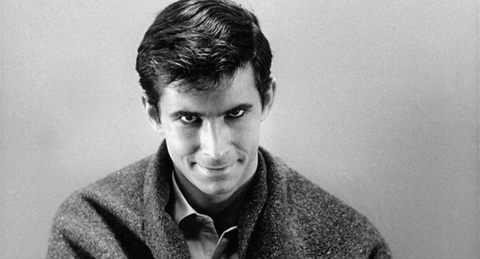
BE: You also mentioned in the audio commentary that you’d been friends with Anthony Perkins, and I was trying to figure out how that came about. I’m guessing it was on the pilot you did with him, The Ghost Writer.
AS: Yeah, he liked Sledge Hammer! His protégé and his stand-in, sort of – I guess you’d call him an understudy – was a guy named Kurt Paul was playing a parody of Norman Bates as the coroner on Sledge Hammer! He got a kick out of it and wanted to have lunch with me, and he said he wanted to do a sitcom. And, you know, that’s something that doesn’t happen every day. [Laughs.] Anthony Perkins is interested in doing a sitcom? But he wanted to stay close to home, and he’s a theatrically trained actor and he loved doing comedy, so I was happy to come up with that for him.
He was a fascinating man. And a wonderful writer. He wrote with Stephen Sondheim a wonderful mystery called The Last of Sheila. And, you know, he didn’t like talking about Psycho a lot, but I was allowed to, for some reason. His wife told me, “That’s nothing you bring up all the time,” but I could usually bring it up whenever I wanted to, and he would answer questions about it that he wouldn’t answer for other people. I think it was because I respected his whole body of work. I wasn’t just coming up to him, waving a hand like there was a knife in it, going, “Eek! Eek! Eek!” [Laughs.] Or making a bunch of shower jokes or something. But he would tell me fascinating stories about Psycho.
And…I’m sorry he’s not around, because he really would’ve enjoyed Bullet in the Face. Because we often talked about humor and horror and violence and, you know, gore and gruesome things, and how these things kind of go hand in hand. So I think he would’ve appreciated some of the mixing that we did in this. It was a very interesting observation Alfred Hitchcock made about the very fine line between entertaining people and real honest-to-goodness horror. He said, “If people are riding on a rollercoaster, they scream…and if the rollercoaster derailed, their screams wouldn’t change very much.” [Laughs.] But, yeah, that’s such a great observation about the razor’s edge you deal with when you deal with edgy stuff.
I mean, because in Episode 3 of Bullet in the Face, when we showed it to a live audience, there’s a scene where Gunter is pursuing a suspect and happens upon a basketball game, and…I won’t give away what happens, for people who haven’t seen the episode, but his trigger-happy nature gets the best of him. And half the audience laughed, and half the audience was shocked by what we saw. So that’s what we were kind of dealing with there. I just read a review from a site that will remain nameless but that I normally like, but the critic was reviewing it and said it wasn’t like Sledge Hammer!, that this wouldn’t appeal to everybody. But that was the whole point! Sledge Hammer! was on a major network, and even though it was offbeat and crazy, it was still user-friendly. And this was designed…not for the same sort of mass appeal. I was going for something very different. I wasn’t just doing Sledge Hammer! again. This was a whole other thing. So you have to appreciate it on its own terms. I also don’t consider it a spoof or a parody of anything. I just view it as existing in its own universe.
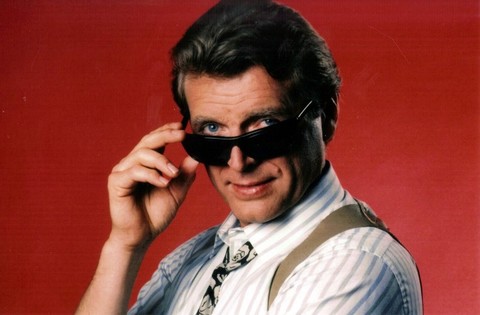
BE: To start wrapping up, in regards to Sledge Hammer!, have you ever considered either bringing back the series or rebooting it? Or are you happy with its legacy standing just as it is?
AS: People have offered that to me and talked about it, but I wouldn’t have the same control, and there’ve been some bad ideas. To me, Bullet in the Face is the logical extension of going in the same kind of genre that I…I don’t even know what you call it! A hyper-violent half-hour comedy? [Laughs.] Or something like that. To me, it’s doing something new, the evolution of that kind of comedy and changing with the times. But everybody wants to do remakes and reboots, with Robocop and whatever. That’s why I think that video piracy is being combated by Hollywood through remakes. Because they remake all these old titles, like Robocop, Total Recall, Hawaii Five-0… We already have these! So I think that’s why they may be doing it. But it periodically comes around, and I’m sure it’ll keep coming around.
But I would do it if I had the same sort of control and everything like that. But people have odd ideas for casting and things like that. And once again, like I said before, I don’t want to be stuck in the ‘80s. I like dealing with what’s ahead and try to stay ahead of the curve. That’s why, when I did Bullet in the Face, I pulled out all the ‘80s and set it in some bizarre futuristic Alphaville world. So I tend not to want to really repeat myself…unless I’m doing an interview, in which case I’ll repeat myself tirelessly. [Laughs.]
BE: And I appreciate it.
AS: But I like to do different things. I mean, I’m talking with Fox Entertainment about doing an unscripted show. So I like to do different things. I don’t tend to like to repeat myself, so if there’s an opportunity to do something new and bizarre and different and push the envelope and avoid the cookie-cutter, I kind of leap at it. So that’s what Bullet in the Face represented, and I’m thrilled, because it was a short run and…the network didn’t support it, but Shout Factory is, so a lot of people are now seeing it for the first time. So I hope it gets a cult. Because I’d like to have two cult shows to my name. [Laughs.]
Related Posts
Comments Off on The Light from the TV Shows: A Chat with Alan Spencer (‘Bullet in the Face’)
Posted in: Entertainment, Interviews, News, Television
Tags: Alan Spencer, Alfred Hitchcock, Andy Kaufman, Anthony Perkins, Barry Took, Bullet in the Face, Dan Pasternack, Dieter Horn in Night Port, Eddie Izzard, Eric Roberts, IFC, Kurt Paul, Leonard Nimoy, Marty Feldman, Marty Feldman: Biography of a Comic Legend, Mel Brooks, Robert Ross, Sledge Hammer!, Star Trek: The Motion Picture, Taxi, The Facts of Life, The Ghost Writer, The Last of Sheila, The Light from the TV Shows, The Nutt House, Will Harris, William Shatner








